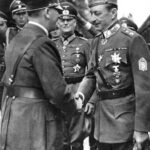How many German officers spoke back to Hitler or criticized him directly and lived? Directly criticizing Hitler or speaking back to him was extremely dangerous, and few German officers dared to do so openly, especially as the war progressed and Hitler’s intolerance for dissent grew. However, there were a few notable instances where German officers expressed their disagreement or criticisms to Hitler and managed to survive, at least for some time.
Field Marshal Erwin Rommel :
Known as the “Desert Fox,” Rommel was one of Nazi Germany’s most celebrated generals. While he never directly criticized Hitler to his face in a confrontational manner, Rommel did express his strategic disagreements with Hitler’s orders, particularly regarding the defense of the Atlantic Wall and the handling of the war in North Africa. Eventually, Rommel was implicated in the July 20, 1944, assassination plot against Hitler and was forced to commit suicide to avoid retribution against his family.
General Heinz Guderian :
A leading figure in the development of armored warfare and the blitzkrieg strategy, Guderian had several heated discussions with Hitler. He was known for his boldness and occasionally confronted Hitler with his disagreements, especially about the misuse of panzer divisions. Guderian was relieved of his command several times but survived the war.
Field Marshal Gerd von Rundstedt :
One of the most senior officers in the Wehrmacht, von Rundstedt occasionally disagreed with Hitler’s strategic decisions. While he often voiced his opinions, he did so in a manner that was more diplomatic and less confrontational. He was dismissed from his command multiple times but managed to live through the war.
General Johannes Blaskowitz :
Blaskowitz criticized the SS and the atrocities committed against civilians, particularly in Poland. He documented his protests in reports sent to superiors, which eventually reached Hitler. Though he was sidelined and faced career setbacks, Blaskowitz survived the war, only to die under mysterious circumstances in 1945, believed to be a suicide.
While these officers did express their disagreements and criticisms, it is important to note that open defiance was rare and typically had severe consequences. The culture of fear and absolute loyalty that Hitler cultivated made dissent extremely perilous.


